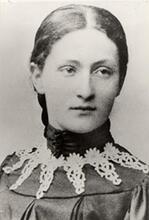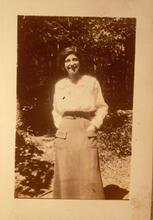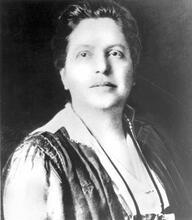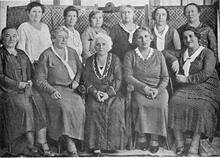Frances Allen De Ford
Frances Allen de Ford was raised in a philanthropic family with a tradition of social work, though she chose to help her community through the rather nontraditional path of medicine rather than the typical women’s work of education or volunteerism. She graduated from Women’s Medical College of Pennsylvania in 1887 and opened a home practice with her husband in the Kensington district of northeast Philadelphia, known for its mills and shipyards. Working at a time when germ theory was just coming into its own, de Ford campaigned for better hygiene conditions to reduce the malarial infection rate. She also encouraged her daughter Miriam to volunteer at the suffrage headquarters in Philadelphia, beginning her on a lifelong crusade for women’s rights. De Ford continued to practice medicine until 1918, when she lost her hearing.
Frances Allen de Ford chose the nontraditional route for women of medical school and medical practice to continue her paternal family’s tradition of philanthropy. As a physician, de Ford pioneered hygiene measures in the Kensington section of northeast Philadelphia, a heavy industrial and malaria-ridden district.
Early Life
Born Frances Allen on April 5, 1855, into an established Philadelphia Jewish family, she was the third of seven children and the second of five daughters of Lewis Marks Allen, a merchant, and Miriam (Arnold) Allen, daughter of wealthy businessman Mayer Arnold. Frances was raised in a family long associated with Congregation Ritual bathMikveh Israel, an established Orthodox Philadelphia congregation.
Education and Family
Unlike her sister Amelia, who became a Hebrew Sunday school teacher and Sunday school superintendent, Frances chose in her later twenties the unorthodox and the less religiously based philanthropic route of entering medical school. Influenced by her future husband, Moses de Ford, eight years her junior, whom she married on June 8, 1887, she gave into her ambition to become a doctor and entered Women’s Medical College of Pennsylvania, while Moses completed his study at Jefferson Medical College.
Work in Medicine and Public Health
Graduating in 1887, de Ford opened a practice with her husband in their home in northeast Philadelphia, then an industrial area of mills and shipyards with a small Jewish population. Here de Ford, with the help of cooks and maids, raised her three children: Alice Rosalie, who became a supervisor of industrial arts within the Philadelphia public school system; Miriam Allen, who became a suffragist, poet, and author; and Allen Vanard, who settled in Washington, D.C.
In Kensington, with her husband, de Ford became noted for her campaigns for better hygiene conditions and a decrease in malarial infection. In addition, her progressive nature was evident in her support of the vote for women. Due to her busy work schedule, however, this support manifested itself mainly through the volunteering of the services of her daughter Miriam at suffrage headquarters in Philadelphia, thereby providing the impetus for her daughter’s initial career as a suffragist.
Later Years
De Ford practiced medicine from her home until the loss of her hearing at age sixty-three. She died on January 9, 1937, from pneumonia at the Jewish Hospital of Philadelphia. Frances Allen de Ford, as a turn-of-the-century women physician who campaigned for better hygiene conditions and supported women’s rights, led a life atypical of her conservative Jewish roots and the expected role of middle-class women of the late nineteenth and early twentieth centuries.
Abram, Ruth. “Private Practice: Taking Every Case to Heart.” In Send Us a Lady Physician: Women Doctors in America, 1835–1920, edited by Ruth J. Abram (1985): 153–162.
AJYB 39 (1937): 590.
“Dr. Frances deFord Dies of Pneumonia.” Philadelphia Inquirer, January 10, 1937.
“F.A. deFord Dies; Woman Physician.” NYTimes, January 10, 1937, sec. 2, 10:8.
Friedman, Murray. Jewish Life in Philadelphia, 1830–1940 (1983).
Gluck, Sherna, ed. “Miriam Allen deFord: On the Soapbox.” In From Parlor to Prison: Five American Suffragists Talk About Their Lives (1976).
Morais, Henry Samuel. The Jews of Philadelphia: Their History from the Earliest Settlements to the Present Time: A Record of Events and Institutions, and of Leading Members of the Jewish Community in Every Sphere of Activity (1894).
Stern, Michael. Americans of Jewish Descent: A Compendium of Genealogy (1971).
Sussman, Lance. Isaac Leeser and the Making of American Judaism (1995).
Whiteman, Maxwell. “Philadelphia Jewish Neighborhoods.” In The Peoples of Philadelphia, edited by Allan F. Davis and Mark H. Haller (1973).










